Which eCommerce Platform Should You Choose For Your Small Business: Trends and Predictions for the Future
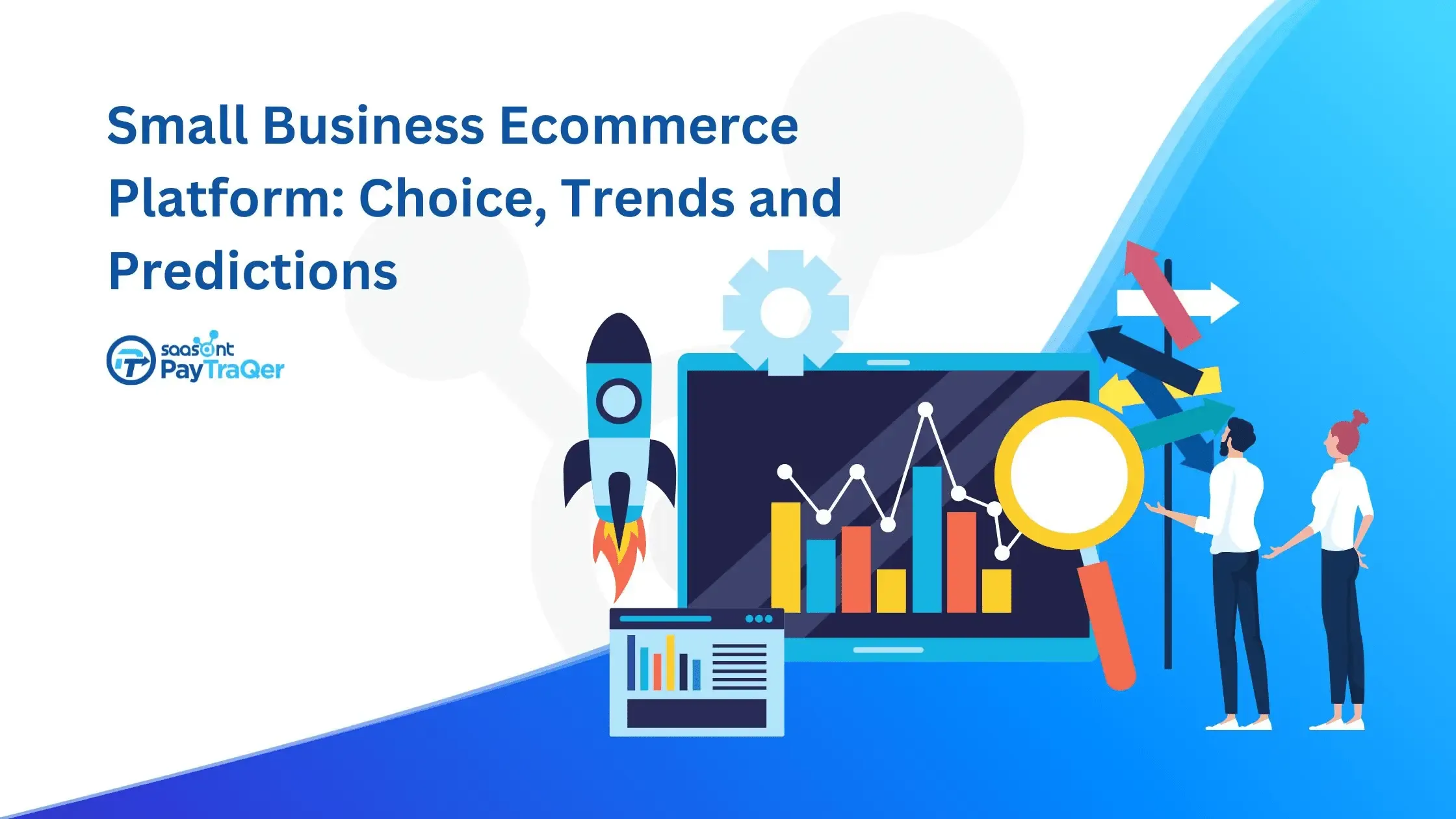
According to Oberlo, in 2023, eCommerce sales worldwide is currently at $6.3 trillion, up from $3.5 trillion in 2019. As eCommerce continues to grow rapidly, small businesses are looking for the right platform to help them reach customers and make sales. In today's digital age, having an online presence is essential for small businesses to succeed. However, with so many eCommerce platforms available, it can be challenging to choose the right one for your business.
When it comes to selecting an eCommerce platform, there are several popular options available. As of 2022, Although Shopify is the preferred eCommerce platform in the United States, its global market share of 20% still lags behind WooCommerce's 23%, based on statistics from Cloudways. WooCommerce, which is built on WordPress, is the most popular eCommerce platform in the world. It is an open-source platform that is popular among businesses that want more flexibility and control over their online stores.
Other notable eCommerce platforms in the US include BigCommerce, Squarespace, and Wix. In this article, we will discuss the market trends and predictions for the future of eCommerce platforms, including the impact of mobile commerce and the use of AI and machine learning. Now, let’s begin with the trends in small business ecommerce platform usage and some of the predictions market analysts have made.
Contents
Trends In Small Business Ecommerce Platform Usage
Predictions of Ecommerce Platforms to Harness for The Future of Your Small Business
Which Ecommerce Platform Should I Choose Based on These Trends and Predictions?
Which Online Platform is Best For Small Business?
How Do I Choose An Ecommerce Platform for My Small Business?
Conclusion
FAQs
Trends In Small Business Ecommerce Platform Usage
Small businesses have embraced e-commerce platforms as an essential tool to reach customers beyond their geographic location. The use of these platforms has grown exponentially, and businesses are constantly seeking new ways to leverage latest features and trends.
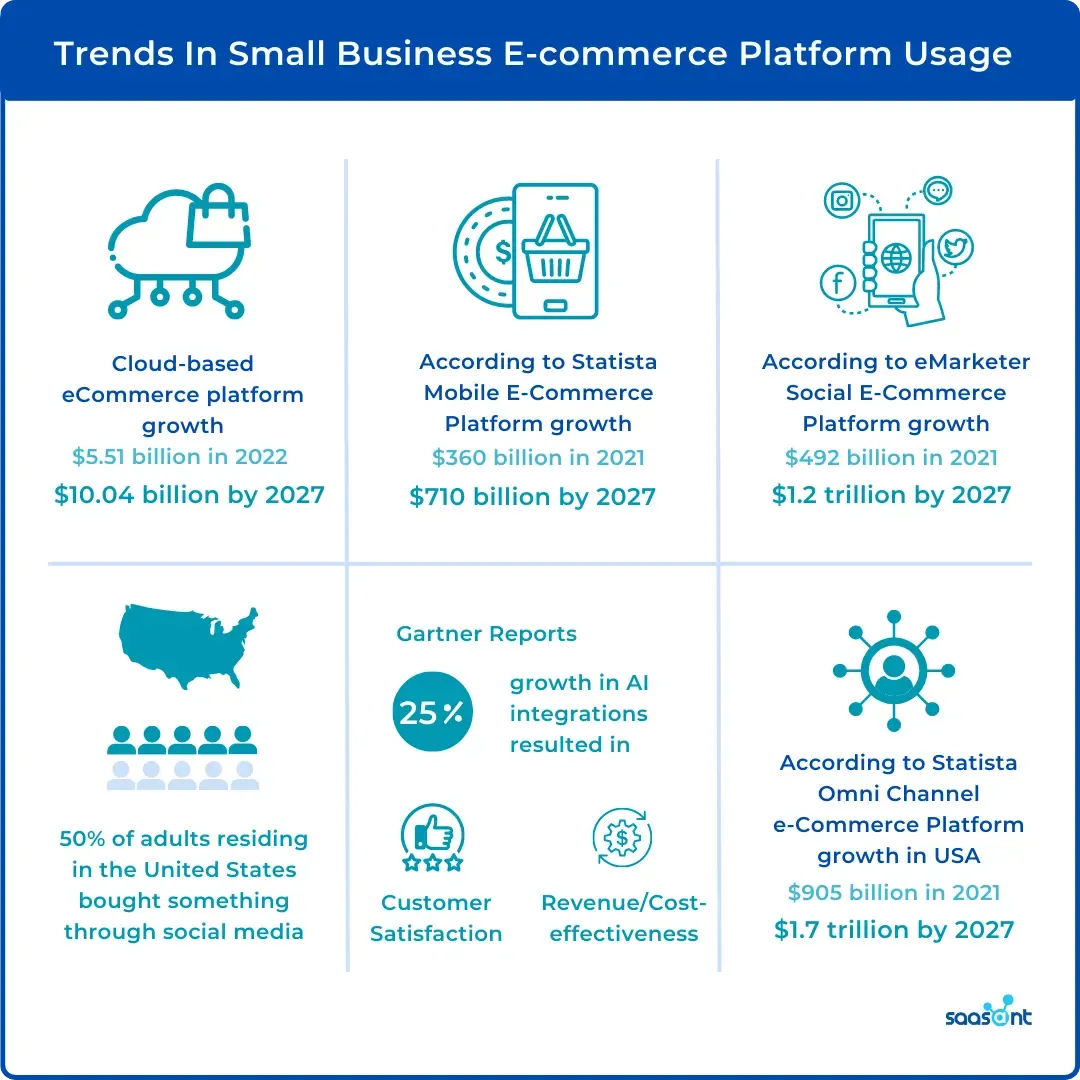
Adoption of Cloud-based Ecommerce Platforms
MarketsandMarkets published a research report projecting that the eCommerce platform market would skyrocket from its 2022 value of USD 5.51 billion to an astounding USD 10.04 billion by 2027, with a compound annual growth rate (CAGR) of 12.8%. This surge in demand is attributed to digital transformation and cloud-based solutions becoming increasingly adopted across industries worldwide.
As the demand for more agile and cost-effective eCommerce solutions grows among small businesses, cloud-based platforms are becoming a popular choice. Such digitally-driven solutions offer scalability without significant upfront investment, providing the flexibility needed to quickly launch online stores with minimal maintenance requirements. Cloud-based eCommerce is rapidly emerging as an effective solution that empowers modern entrepreneurs by addressing their evolving needs in ambitious digital marketplaces.
As a result, small businesses are turning to cloud-based solutions to launch and manage their online stores, enabling them to compete more effectively with larger eCommerce players. Small and medium-sized enterprises (SMEs) are expected to experience the greatest growth rate. Additionally, cloud deployment is anticipated to dominate the market size over this same time frame.
Increased Use of Mobile-friendly Ecommerce Platforms
According to Statista, retail m-commerce sales in the United States skyrocketed to over 360 billion U.S. dollars in 2021 and is expected to double by 2025, totaling approximately 710 billion U.S. dollars! In the years ahead, e-commerce will likely constitute a growing percentage of retail sales across America.
With the growing use of mobile devices for online shopping, small businesses are increasingly turning to mobile-friendly eCommerce platforms that offer a seamless and optimized shopping experience across all devices.
The trend is due to the growing importance of mobile devices in eCommerce, as consumers increasingly use their smartphones and tablets to browse and shop online. By optimizing their online stores for mobile devices, small businesses are now tapping into the power of eCommerce platforms to create a seamless shopping experience that not only increases conversions but also keeps customers coming back. With these mobile-friendly solutions, they can guarantee an optimal user experience on any device - providing endless opportunities and potential profits.
Integration with Social Media Platforms
Small businesses are increasingly integrating their eCommerce platforms with social media platforms like Facebook, Instagram, and Pinterest, enabling them to reach a wider audience and drive sales through social media channels.
According to eMarketer, social commerce is projected to grow three times faster than the traditional form of ecommerce, escalating from $492 billion worldwide in 2021 up to a whopping $1.2 trillion by 2025! It is estimated that approximately 50% of adults residing within the United States bought something through social media.
Social media has become an integral aspect of eCommerce, as digital shoppers increasingly turn to their favorite platforms for product discovery and recommendations. This shift is driving growth in the industry and prompting small businesses to adopt integrated solutions that will allow them to sell products directly through social media channels – unlocking a powerful resource for sales success and customer engagement.
Use of AI and Machine Learning in Ecommerce Platforms
Gartner reported that the majority of organizations that have implemented AI for digital commerce will experience at least a 25% growth in customer satisfaction, revenue, or cost-effectiveness. This growth is driven by the increasing use of AI and machine learning in eCommerce platforms, enabling businesses to offer personalized recommendations, chatbots, and virtual assistants.
Small businesses are increasingly turning to AI and machine learning to enhance their eCommerce platforms, offering personalized experiences to customers and improving efficiency and productivity.
The trend is driven by the need for businesses to offer personalized experiences to customers, while also improving efficiency and productivity. AI and machine learning enable eCommerce platforms to offer personalized recommendations and virtual assistants that can assist customers with their purchases, while also automating tasks such as inventory management and order fulfillment.
Increased Use of Omnichannel Ecommerce Platforms
As a result of the convenience, speed and scalability that omnichannel eCommerce platforms offer, small businesses are rapidly turning to them in order to skyrocket their sales across multiple channels, from online marketplaces and social media accounts to physical stores.
According to Statista Digital Market Outlook, the United States generated around $905 billion in 2022 through retail e-commerce revenues, this number is expected to soar to over 1.7 trillion dollars by 2027! This growth is driven by the increasing use of omnichannel eCommerce platforms, which enable businesses to reach customers across multiple channels, driving sales and customer engagement.
The driver of this trend is the need for businesses to offer a seamless shopping experience across multiple channels, as customers increasingly expect to be able to shop wherever and whenever they want. Omnichannel eCommerce platforms enable businesses to sell products across multiple channels, while also offering a consistent and personalized shopping experience to customers.
In summary, these trends are driven by the growing importance of eCommerce for small businesses, as they look for ways to compete more effectively with larger eCommerce players. By adopting cloud-based, mobile-friendly, AI-enabled, and omnichannel eCommerce platforms, small businesses can offer personalized and seamless shopping experiences to customers, driving sales and customer loyalty.
Predictions of Ecommerce Platforms to Harness for The Future of Your Small Business
Having discussed some of the trends in ecommerce accounting platform usage, the following are predictions of the future that your business can leverage to become a strategic player in the ecommerce industry.
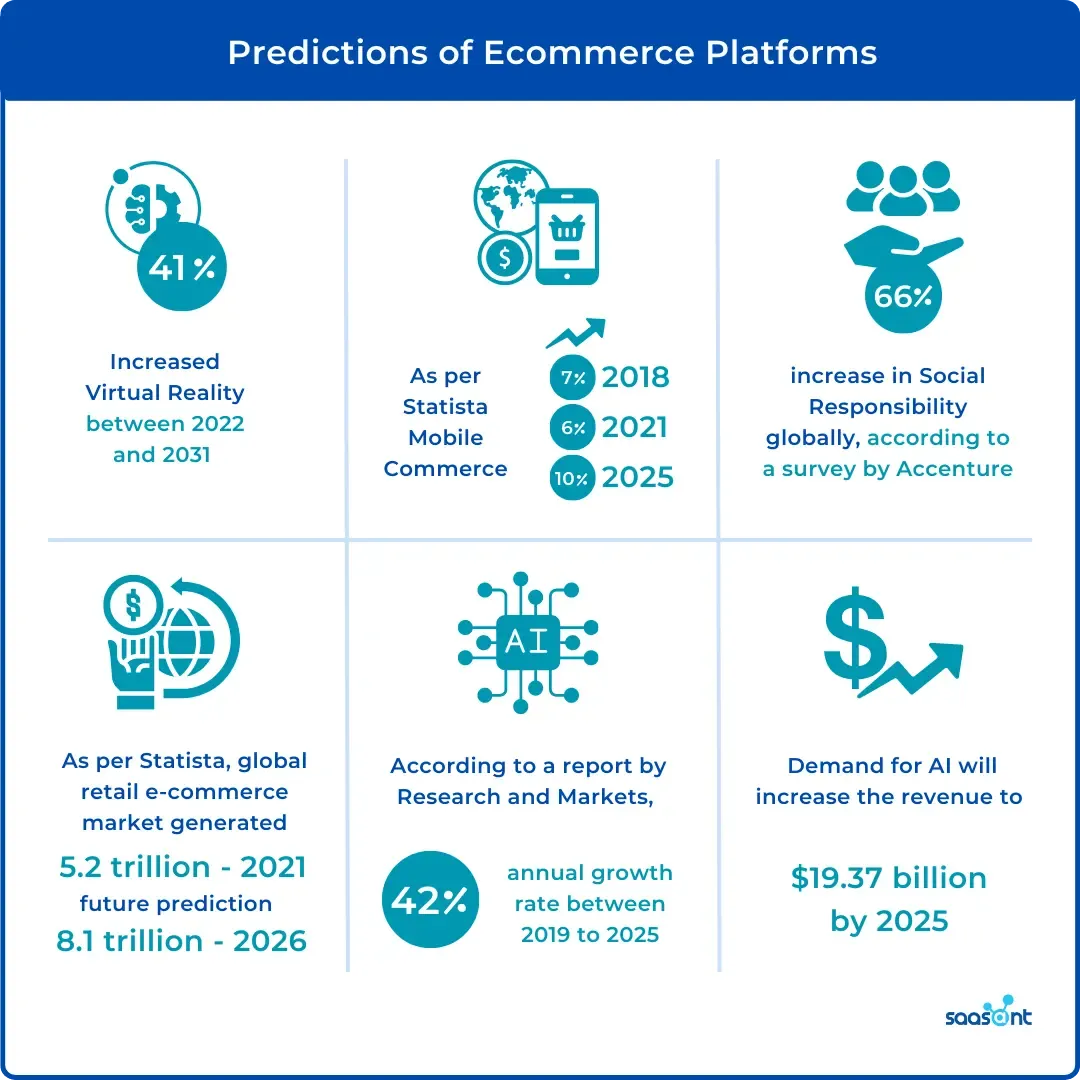
Increased Adoption of Augmented and Virtual Reality
According to a report by Allied Market Research, the worldwide augmented reality in retail market size skyrocketed from $2 billion in 2021 to an estimated value of up to $61.3 billion by 2031, demonstrating impressive growth with an exponential compound annual growth rate (CAGR) of 41.4% between 2022 and 2031.
Also, A study by Digital Information World found that 66% of respondents indicated that a branded Augmented Reality (AR) experience would make them more inclined to purchase a product.
Small businesses are likely to increasingly adopt augmented and virtual reality technologies to enhance their eCommerce platforms. This will enable them to offer more immersive shopping experiences to customers, allowing them to try on products virtually and visualize how they will look in their homes.
Growing Importance of Mobile Commerce
With more customers shopping on their mobile devices, small businesses will need to prioritize mobile commerce in order to remain competitive. This will require them to offer mobile-optimized eCommerce platforms that are easy to navigate and use on smaller screens.
According to Statista, By the year 2025, it is projected that more than ten percent of all retail sales in America will be initiated through mobile commerce. This figure would signify an increase of nearly seven percentage points since 2018. It was forecasted in 2021 that m-commerce would contribute to approximately six percent of overall retail sales.
Greater Focus on Sustainability and Social Responsibility
Consumers are increasingly concerned about sustainability and social responsibility, and small businesses will need to respond to these concerns in order to remain relevant. This will require them to adopt sustainable business practices and offer products that are eco-friendly and socially responsible. According to a survey by Accenture, 62% of consumers globally want companies to take a stand on current and broadly relevant issues such as sustainability and transparency.
Expansion Into International Markets
In 2021, the global retail e-commerce market generated a whopping 5.2 trillion dollars in revenue, according to Statista. Analysts predict that this figure will rise by an astonishing 56% over the next few years, reaching 8.1 trillion by 2026 and reaffirming just how much digital shopping has taken off amid modern times.
As eCommerce continues to grow around the world, small businesses will increasingly look to expand into international markets. This will require them to adopt eCommerce platforms that can handle multiple currencies and languages, and comply with local regulations.
Currently leading the pack is Chinese giant Alibaba with online sales of over 700 billion USD in 2022 – yet come 2027 Amazon may overtake its competitor’s impressive numbers to become number one when they are predicted to generate over 1.2 trillion US dollars through their own e-commerce efforts!
Continued Growth of AI and Machine Learning
AI and machine learning will continue to play an important role in eCommerce platforms, enabling small businesses to offer more personalized experiences to customers and automate tasks such as inventory management and order fulfillment.
According to a report by Research and Markets, as the demand for AI in retail and e-commerce rises, experts estimate that the global market will expand at a compound annual growth rate of 42.8% between 2019 to 2025. This is expected to drive revenue up to $19.37 billion by 2025!.
Which Ecommerce Platform Should I Choose Based on These Trends and Predictions?
Choosing the right eCommerce platform for your small business can be a crucial decision that can impact your success in the long term. Based on the trends and predictions, here are some factors to consider in choosing an eCommerce platform:
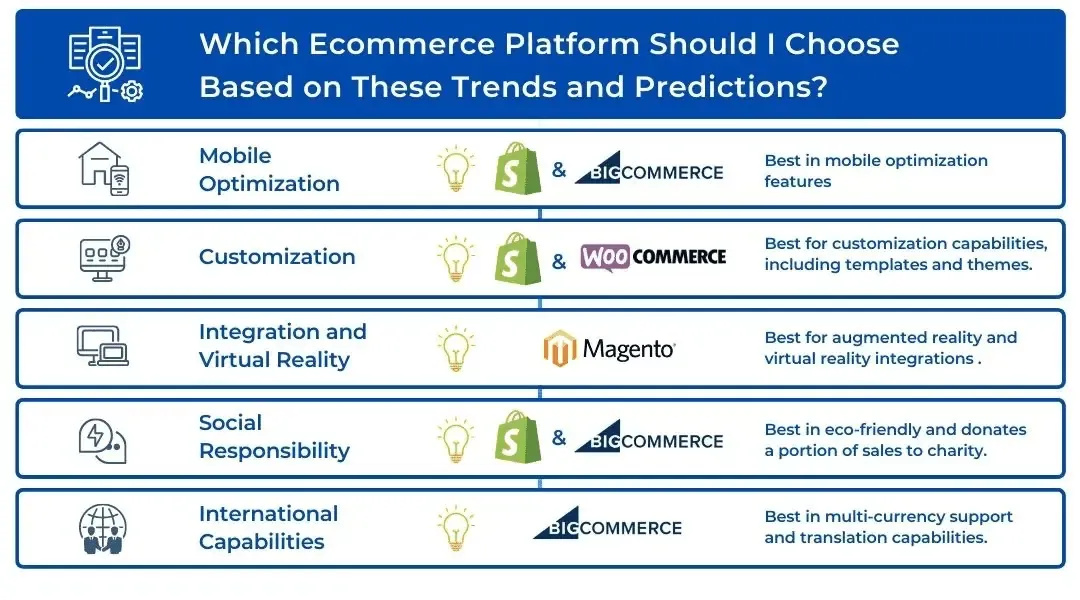
Mobile Optimization
With the growth of mobile commerce, it's crucial to choose an eCommerce platform that provides a smooth mobile experience for your customers. Look for a platform that offers responsive design, mobile-friendly checkout, and a mobile app or a mobile-friendly interface.
Tip: Shopify and BigCommerce are two popular eCommerce platforms known for their mobile optimization features.
Customization
In a competitive eCommerce landscape, having a unique brand identity can be essential in attracting and retaining customers. Therefore, it's important to choose an eCommerce platform that allows for customization and flexibility in design and functionality.
Tip: WooCommerce is an eCommerce platform built on WordPress, which is known for its customization capabilities, while Shopify also offers a wide range of customization options, including templates and themes.
Integration with Augmented and Virtual Reality
With the growing adoption of augmented and virtual reality technologies, incorporating these features into your eCommerce platform can provide a more engaging shopping experience for your customers. Choose an eCommerce platform that offers integration with augmented and virtual reality technologies to showcase your products in a more interactive way.
Tip: Magento is an eCommerce platform that offers augmented reality and virtual reality integrations to enhance the customer experience.
Sustainability and Social Responsibility
Consumers are becoming more conscious of sustainability and social responsibility, and businesses that demonstrate these values can stand out in a crowded market. Look for an eCommerce platform that allows you to highlight your sustainable and socially responsible practices.
Tip: Shopify and BigCommerce both offer features to help you showcase your sustainable and socially responsible practices, such as highlighting eco-friendly products and donating a portion of sales to charity.
International Capabilities
If you plan to expand into international markets, choose an eCommerce platform that can handle multiple currencies, languages, and comply with local regulations.
Tip: BigCommerce offers multi-currency support and translation capabilities, while Shopify allows you to easily sell in multiple countries and accepts payments in over 100 different currencies.
Ultimately, the eCommerce platform you choose for your small business will depend on your specific needs and goals. It's important to research and compare different platforms to find the one that offers the features and functionality that best align with your business needs.
Which Online Platform is Best For Small Business?
There is no one-size-fits-all answer to this question, as the best online platform for small business will depend on the specific needs and goals of the business. Also, you should consider the factors discussed in the previous section to choose the best ecommerce platform for your business. Some popular online platforms for small businesses include:
Shopify
An all-in-one ecommerce accounting platform that allows businesses to create an online store, manage their inventory, process payments, and handle shipping and fulfillment. Shopify is known for its ease of use and user-friendly interface, as well as its extensive app store that allows for customization and functionality.
WooCommerce
An eCommerce plugin for WordPress that allows businesses to create an online store using the WordPress platform. WooCommerce is known for its flexibility and customization capabilities, as well as its extensive community of developers and designers.
BigCommerce
It is another all-in-one eCommerce platform that allows businesses to create an online store, manage their inventory, process payments, and handle shipping and fulfillment. BigCommerce is known for its scalability and flexibility, as well as its extensive integration options.
Square Online
This is a free eCommerce platform that allows businesses to create an online store, manage their inventory, and process payments. Square Online is known for its simplicity and ease of use, as well as its integration with Square's point-of-sale system.
How Do I Choose An Ecommerce Platform for My Small Business?
Choosing an eCommerce platform for your small business can seem overwhelming, but there are some key factors to consider to help make the decision easier. Here are some steps you can follow to choose the right eCommerce platform for your small business:
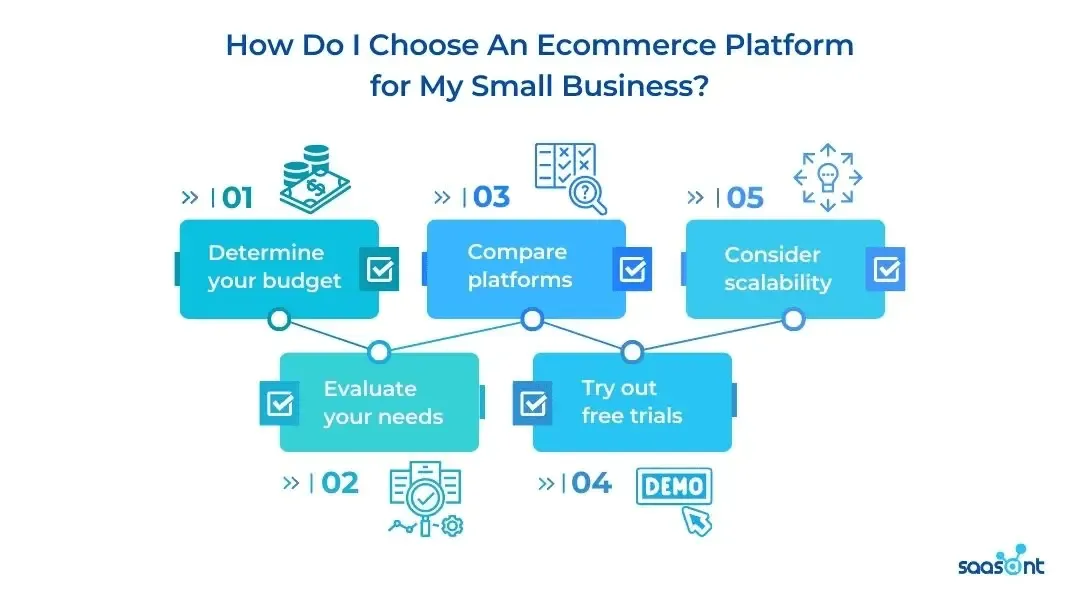
Determine your budget
Before you start researching different eCommerce platforms, it's important to determine how much you can afford to spend. Different platforms have different pricing models, so it's important to consider upfront costs as well as ongoing fees.
Evaluate your needs
Consider what features and functionality are most important to your business. Do you need a platform that can handle a large inventory? Do you need advanced shipping and fulfillment options? Do you need built-in marketing tools? Make a list of your must-have features to help guide your search.
Research and compare platforms
Once you have a sense of your budget and needs, start researching different eCommerce platforms. Look at factors such as pricing, features, ease of use, customization options, and customer support. Consider reading reviews from other small business owners to get a sense of their experiences with different platforms.
Try out demos or free trials
Many eCommerce platforms offer demos or free trials that allow you to test out the platform before committing. Take advantage of these options to get a hands-on feel for the platform and determine whether it meets your needs.
Consider scalability
As your business grows, your eCommerce needs may change. Consider choosing a platform that can grow with your business and offer scalability options.
Conclusion
In conclusion, choosing the right eCommerce platform for your small business is crucial to your success in the online marketplace. With so many options available, it's essential to consider your business needs, budget, and future growth plans when making a decision.
Currently, popular eCommerce platforms for small businesses include Shopify, WooCommerce, Magento, and BigCommerce. However, with the rapid advancements in technology, the eCommerce industry is constantly evolving, and new trends and platforms are emerging.
The future of eCommerce is predicted to be shaped by increased personalization, voice commerce, artificial intelligence, and virtual reality. As such, it's vital for small businesses to stay up-to-date with the latest trends and adopt new technologies to remain competitive in the market.
Ultimately, the best ecommerce accounting platform for your small business depends on your unique needs and preferences. By carefully evaluating your options and keeping an eye on emerging trends, you can select a platform that supports your business growth and success in the long run.
FAQs
What is the cheapest ecommerce website?
The cheapest eCommerce website options are typically open-source platforms such as Magento and WooCommerce. These platforms offer free versions that can be downloaded and customized, but may require additional expenses for hosting, security, and maintenance.
While these options can be cost-effective, they may also require technical knowledge and expertise to set up and manage. Additionally, these platforms may lack some of the advanced features and support offered by paid eCommerce platforms.
For small businesses with limited budgets and technical know-how, it may be worth considering low-cost options like Shopify Lite or Big Cartel, which offer basic features and transaction fees at a more affordable price point.
Best Free Ecommerce Platform for Small Business
When it comes to the best free eCommerce platforms for small businesses, there are several options to consider. One of the most popular is WooCommerce, which is a plugin for WordPress that allows users to create an online store for free.
It is user-friendly, has a large community of users and developers, and offers a range of features, extensions, and themes. Another option is Shopify Lite, which offers a limited set of features and transaction fees but is a great option for businesses just starting out.
Big Cartel is another free platform that is best suited for artists, makers, and creatives. Ultimately, the best free eCommerce platform for your small business will depend on your unique needs, budget, and technical expertise.
What is the No 1 eCommerce platform?
The number one eCommerce platform is currently Shopify. Shopify is a leading cloud-based eCommerce platform that allows users to create online stores and sell products online. It offers a range of features and benefits, including a user-friendly interface, customizable templates, built-in payment processing, shipping and inventory management, and integrations with third-party apps and services.
It is also highly scalable and can accommodate businesses of all sizes, from small startups to large enterprises. In addition, Shopify has a large community of users and developers, making it easy to find support, resources, and tutorials to help you grow your online business.
Which platform should I choose for my ecommerce website?
The platform you should choose for your eCommerce website will depend on several factors, including your budget, technical expertise, business goals, and the features and functionality you require. Here are some key considerations to help you choose the right platform:
Budget
Determine how much you can afford to spend on eCommerce platform fees, hosting, and maintenance.
Technical expertise
Assess your own technical skills or the availability of a developer who can help you set up and manage the platform.
Business goals
Consider your business goals and the features and functionality you need to achieve them, such as inventory management, payment processing, shipping, and customer support.
Scalability
Choose a platform that can grow with your business, whether you're just starting out or have plans to expand.
Some popular eCommerce platforms to consider include Shopify, WooCommerce, Magento, and BigCommerce. It's important to do your research, read reviews, and compare features and pricing to find the right platform for your specific needs.
Which e-commerce business model should I choose?
There are several e-commerce business models to choose from, and the best one for your business will depend on your goals, budget, and target market. Here are some of the most popular e-commerce business models:
Business-to-consumer (B2C): This model involves selling products or services directly to individual consumers through your online store.
Business-to-business (B2B): This model involves selling products or services to other businesses through your online store.
Dropshipping: This model allows you to sell products without holding inventory. When a customer places an order on your website, you purchase the product from a third-party supplier who ships it directly to the customer.
Subscription: This model involves charging customers a recurring fee in exchange for access to your products or services.
Marketplace: This model allows you to connect buyers and sellers on your platform and take a commission on each transaction.
When choosing an e-commerce business model, consider your target market, the types of products or services you plan to sell, and your budget for marketing and advertising. It's also important to research your competition and analyze consumer trends to determine which business model is most likely to be successful for your specific business.
Best Ecommerce Platform for Startups
Some of the best e-commerce platforms for startups include Shopify, WooCommerce, and BigCommerce. Shopify is known for its user-friendly interface and wide range of features, while WooCommerce is a great choice for those who already have a WordPress website.
BigCommerce is an excellent option for startups looking for scalability and customization options. Ultimately, the best e-commerce platform for your startup will depend on your specific needs and budget. It's essential to do your research, consider your requirements, and choose a platform that meets your business's unique needs.
Ecommerce Small Business Ideas
There are many ecommerce business ideas that can be started by small businesses. Here are a few examples:
Online Store: Launching an online store can be a great ecommerce business idea for small businesses. You can sell anything from handmade crafts to niche products like organic foods or beauty products.
Subscription Boxes: Subscription boxes are a popular ecommerce business idea that offers a recurring revenue stream. You can create subscription boxes for various niches such as beauty, pet care, or healthy snacks.
Digital Products: Small businesses can sell digital products such as ebooks, courses, and software online. This is a great way to monetize expertise and knowledge.
Dropshipping: Dropshipping is an ecommerce business model where you don't need to hold inventory, instead, you partner with a supplier who ships products directly to customers. This can be a low-cost and low-risk way to start an ecommerce business.
Print-on-Demand: Print-on-demand is an ecommerce business model where products like t-shirts, mugs, and phone cases are printed on demand as orders come in. This can be a good option for small businesses with limited capital.
Online Services: Small businesses can offer services such as web design, social media management, or writing services online through ecommerce platforms.
Ecommerce Platform Examples
Here are some examples of e-commerce platforms:
Shopify
WooCommerce
Magento
BigCommerce
Squarespace
Wix
Volusion
OpenCart
PrestaShop
3dcart
Weebly
Big Cartel
Salesforce Commerce Cloud
Zen Cart
osCommerce